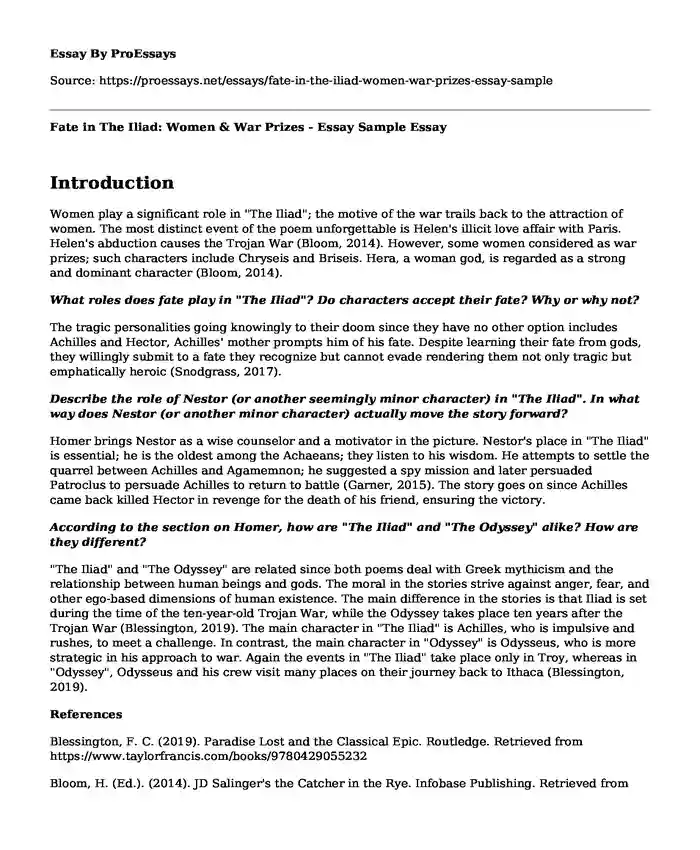Introduction
Women play a significant role in "The Iliad"; the motive of the war trails back to the attraction of women. The most distinct event of the poem unforgettable is Helen's illicit love affair with Paris. Helen's abduction causes the Trojan War (Bloom, 2014). However, some women considered as war prizes; such characters include Chryseis and Briseis. Hera, a woman god, is regarded as a strong and dominant character (Bloom, 2014).
What roles does fate play in "The Iliad"? Do characters accept their fate? Why or why not?
The tragic personalities going knowingly to their doom since they have no other option includes Achilles and Hector, Achilles' mother prompts him of his fate. Despite learning their fate from gods, they willingly submit to a fate they recognize but cannot evade rendering them not only tragic but emphatically heroic (Snodgrass, 2017).
Describe the role of Nestor (or another seemingly minor character) in "The Iliad". In what way does Nestor (or another minor character) actually move the story forward?
Homer brings Nestor as a wise counselor and a motivator in the picture. Nestor's place in "The Iliad" is essential; he is the oldest among the Achaeans; they listen to his wisdom. He attempts to settle the quarrel between Achilles and Agamemnon; he suggested a spy mission and later persuaded Patroclus to persuade Achilles to return to battle (Garner, 2015). The story goes on since Achilles came back killed Hector in revenge for the death of his friend, ensuring the victory.
According to the section on Homer, how are "The Iliad" and "The Odyssey" alike? How are they different?
"The Iliad" and "The Odyssey" are related since both poems deal with Greek mythicism and the relationship between human beings and gods. The moral in the stories strive against anger, fear, and other ego-based dimensions of human existence. The main difference in the stories is that Iliad is set during the time of the ten-year-old Trojan War, while the Odyssey takes place ten years after the Trojan War (Blessington, 2019). The main character in "The Iliad" is Achilles, who is impulsive and rushes, to meet a challenge. In contrast, the main character in "Odyssey" is Odysseus, who is more strategic in his approach to war. Again the events in "The Iliad" take place only in Troy, whereas in "Odyssey", Odysseus and his crew visit many places on their journey back to Ithaca (Blessington, 2019).
References
Blessington, F. C. (2019). Paradise Lost and the Classical Epic. Routledge. Retrieved from https://www.taylorfrancis.com/books/9780429055232
Bloom, H. (Ed.). (2014). JD Salinger's the Catcher in the Rye. Infobase Publishing. Retrieved from https://www.academia.edu/3640914/Harold_bloom_on_jd_salinger
Garner, R. (2015). From Homer to tragedy: the art of allusion in Greek poetry. Routledge. Retrieved from https://www.taylorfrancis.com/books/9781315777856
Snodgrass, A. M. (2017). The "hoplite reform" revisited. In The Armies of Classical Greece (pp. 3-19). Routledge. Retrieved from https://el.b-ok2.org/book/3719327/5babb0
Frequently Asked Questions (FAQ) for Essay:
What role does fate play in "The Iliad"? How do characters respond to their predetermined fate?
Fate plays a prominent role in "The Iliad," with characters such as Achilles and Hector accepting their fate despite warnings from gods; thus revealing both tragedy and heroism within this mythological tale.
How does Nestor contribute to the progression of the story in "The Iliad"?
Nestor serves as an influential advisor and motivator in "The Iliad." Being the oldest among the Achaeans, his wisdom is greatly respected, making him an instrumental force in trying to resolve conflict between Achilles and Agamemnon. Nestor suggests sending spy missions and convincing Patroclus to persuade Achilles back into battle - leading ultimately to his revenge against Hector and eventual victory for Achilles and Agamemnon.
In what ways are "The Iliad" and "The Odyssey" alike? How do they differ?
"The Iliad" and "The Odyssey" both explore Greek mythology and investigate human-god relationships through various human emotions, such as anger or fear. Both works share a moral theme of overcoming such human traits as anger or fear, yet differ significantly in terms of setting and protagonist. While one book depicts Achilles during the Trojan War while its successor "The Odyssey" takes place postwar with Odysseus having more strategic qualities. Furthermore, one story takes place predominantly within Troy while "The Odyssey" travels throughout various locations before returning back home to Ithaca whereas both texts cover different elements from our modern-day reality.
Cite this page
Fate in The Iliad: Women & War Prizes - Essay Sample. (2023, Mar 27). Retrieved from https://proessays.net/essays/fate-in-the-iliad-women-war-prizes-essay-sample
If you are the original author of this essay and no longer wish to have it published on the ProEssays website, please click below to request its removal:
- Friedrich Nietzsche Biography
- Theories About the Plays Attributed to Shakespear Essay
- Space Shuttle Challenger Disaster: Professional, Ethical and Moral Issues Essay
- The Language of the Third Reich Essay Example
- Critical Essay Sample on To Kill a Mockingbird
- Ethical Egoism: Right vs. Consequences for Others - Essay Sample
- Essay on Exploring Identity: How Essentialism and Social Constructivism Relates to Race







